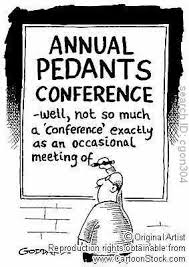pedantry
英 [ˈped.ən.tri]
美 [ˈped.ən.tri]
- n. 迂腐;卖弄学问;假装学者

记忆方法
为了记忆单词“pedantry”,可以采用以下记忆方法:
将“pedantry”分解为“ped”和“antry”。联想“ped”为“pedestrian”,即行人,想象一个行人(pedestrian)过于强调自己的书本知识,表现出不必要的书呆子气(antry)。这种形象化的联想有助于将“pedantry”与“学究气、过于刻板地坚持书本知识”这一概念联系起来。
将“pedantry”分解为“ped”和“antry”。联想“ped”为“pedestrian”,即行人,想象一个行人(pedestrian)过于强调自己的书本知识,表现出不必要的书呆子气(antry)。这种形象化的联想有助于将“pedantry”与“学究气、过于刻板地坚持书本知识”这一概念联系起来。
以上内容由AI生成, 仅供参考和借鉴
中文词源
pedantry 迂腐,学究气的
来自pedant,迂夫子,学究。
英语词源
- pedantry (n.)
- 1610s, from Italian pedanteria, from pedante, or from French pédanterie, from pédant (see pedant).
权威例句
- 1. The book is a demonstration of scholarship without pedantry.
- 这本书表现出学术水平又不故意卖弄学问.
- 2. As a bel esprit he despised pedantry whether in a man or in a bluestocking.
- 作为一个才子,他看不起卖弄学问的作风,不管这种作风是由男人还是女才子所表现出来的.
- 3. He had all the illumination of wisdom and none of its pedantry.
- 他具有智慧的一切光辉,却没有丝毫学究的迂腐气息.
- 4. Governmental organizations are too pedantry, with slavish attention to rules.
- 不过英国得政府机构很迂腐,做事情一定要按照条例.
- 5. Generation gap, conservation, reminiscence, pedantry and stubbornness all basically derive from that.
- 代沟, 保守, 怀旧, 迂腐顽固,基本都源于此.